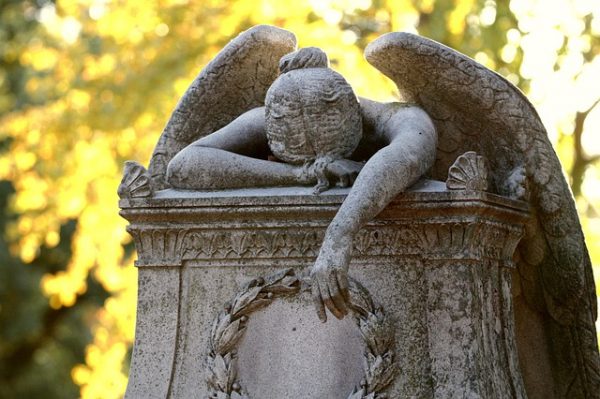
OpenRoadPR / Pixabay
Six weeks ago, my 26-year old nephew took his own life. The month before that, my 90-year old mother died. The grief I feel about my nephew doesn’t seem the same as what I feel about my mother.
They both can stop me in my tracks in a way that sometimes shocks me. With my mother, though, I find I can be more philosophical and reflect on the good long life she lived. When I think of my nephew, I feel a deep well of helplessness. Jim LaPierre, who is a counselor and the Executive Director of Higher Ground Services in Brewer, would say I’m actually feeling powerless.
Jim is a fellow blogger at Bangor Daily News. He graciously agreed to write a guest post for Catching Health about struggling with grief. The holidays can be especially difficult for people who have lost someone dear — no matter how it happened. If you’re having a hard time, I hope this helps.
Written by Jim LaPierre LCSW, CCS, Executive Director of Higher Ground Services in Brewer, Maine. He is a Recovery Ally, mental health therapist and addictions counselor.
“Where did we go wrong?”
“There must have been signs we overlooked.”
“S/he seemed so happy just before they … (died).”
These are the questions and concerns folks most often express when a loved one completes suicide.
We say, “I’m sorry for your loss.” It’s a sentiment with a terribly hollow ring. We offer these words because it’s how we’ve been conditioned to acknowledge the death of a loved one. The intention matters. It’s graciously received. Still, we’re left wondering; There must be something more we can do?
This is the experience of powerlessness. Folks tend to confuse it with helplessness and hopelessness. Powerlessness is simply the experience of having no control or ability to evoke a desired outcome. It can leave us feeling insufficient and frustrated with ourselves.
Grieving versus suffering
The conversations are eerily similar. “Please let me know if there’s anything I can do — anything at all.” Those phone calls almost never come. Folks tend to be a bit too stoic in the midst of loss. As a therapist, I urge folks to consider the difference between grieving and suffering
Grieving is sharing pain with good people. It affords us opportunities to release pain and adjust to loss. Too often we fear burdening others or “bringing them down.” In truth, allowing others to support us affords them an opportunity to be of service, which is far better than feeling powerless to help our loved ones who are hurting.
Suffering is experiencing pain alone. We may release pressure but not necessarily pain. We know that there are five stages of grief: Denial, Anger, Bargaining, Depression, and Acceptance (DABDA). Suffering is a barrier to processing loss. It’s not something we consciously choose. It’s usually a subconscious decision based in fear.
We fear that letting go of pain will result in losing the positive memories of our loved ones. The truth is, this is to some degree inevitable. Their images we hold will fade over time. We will find through the years that we cannot easily recall the sound of their voice or picture their smile exactly as it was. This is natural.
It is not natural to bury the young nor the (seemingly) healthy. Nor is it natural to say goodbye to someone who has already left. Suicide is most often the choice of a person who cannot imagine any other means by which their pain will end sufficiently or readily enough. Their choice is tragically irreversible; ours lies before us.
When we speak of “honoring” our loved ones, I believe it means having the lives they’d want us to have. For whatever reason they chose to end their lives, surely, they want peace and happiness in ours. Letting go of pain means making room for joy, fulfillment, and serenity.
No one “gets over” these losses. We go through them and we must not endeavor to do so alone. We must be brave enough to be vulnerable and to share our experience with those who understand and care.
Support
I often recommend grief groups in local funeral homes. I strongly encourage attending Al-Anon and Nar-Anon groups for affected others and I encourage folks to become involved in NAMI (National Association for the Mentally Ill). In a very high percentage of cases, mental illness, substance use, and addiction are strongly connected to suicide.
If someone dear to you has lost a loved one to suicide, I urge you to speak to them and of their loved one.
Too often those who complete suicide become Voldemort – they who must not be named. Processing grief hinges upon sharing our experience, strength, and hope. Share your memories and appreciation of those who have gone before us.
Never walk on eggshells and do not wait to be asked. Just reach out, invite, and offer. Because there’s a lot of work to be done. While most folks know the five stages of grief (D.A.B.D.A.) far fewer are familiar with the T.E.A.R. model.
- To accept the reality of loss
- Experience the pain of loss
- Adjust to the new environment without the lost person
- Reinvest in the new reality
People get stuck in grief and loss. They need our active support and encouragement to carry on. Be tenaciously loving. Keep showing up and keep offering opportunities to be included and to pursue purpose and passion.
“Pray for the dead and fight like hell for the living.” – Mother Jones

Diane, thank you for this.